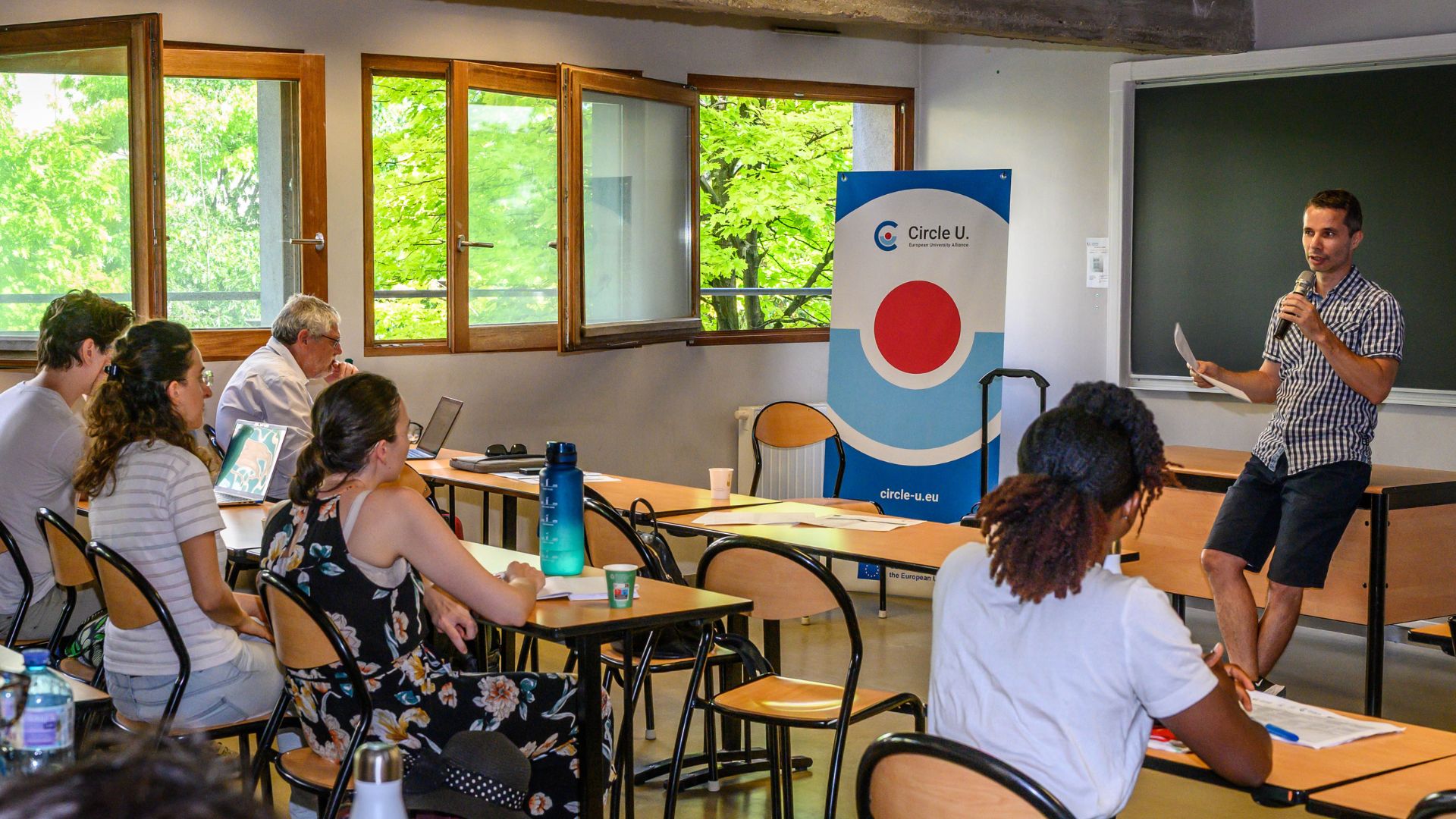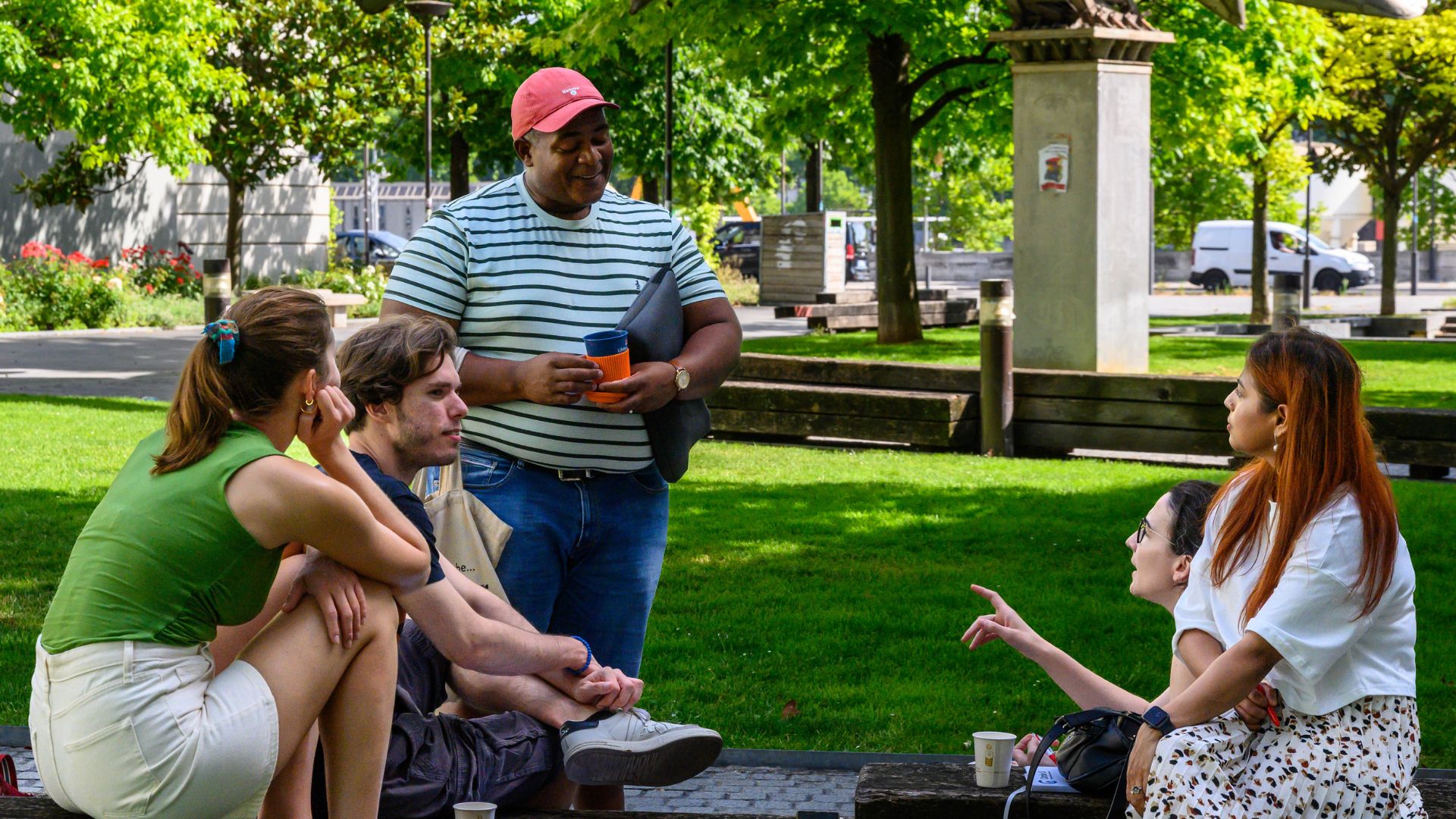ECTS
120 crédits
Niveau d'études visé
BAC +5 (niveau 7)
Durée
2 ans
Langue des enseignements
Anglais
Présentation
The Health Engineering Master’s program (BME Paris) is designed to provide a two-year education in the field of bioengineering, at the intersection of biomedical sciences and engineering sciences. It results from a partnership between Université Paris Cité and Arts et Métiers .
The Master’s program is based on a distinctive partnership that fosters an interdisciplinary approach, encourages student initiatives and promotes a global perspective. This policy is supported by the top-level and complementary expertise and know-how of the two partners: engineering science in the engineering school within Arts et Métiers, on the one hand, and biomedical and health science at Université Paris Cité, on the other.
The teaching staff are primarily drawn from the partner institutions. Guest lecturers include hospital clinicians from APHP and researchers from other schools and academic institutions as well as from private companies (e.g. GE Healthcare, Philips Healthcare, Renault, Sanofi, Thalès, Materialise Medical, etc.).
Learning outcomes
The BME Paris Master offers an exemplary program of excellence designed for students from diverse backgrounds, including biology, chemistry, physics, mathematics, engineering, medicine, pharmacy, health sciences and computer sciences. The primary objectives of the Master’s program are:
- to provide students with the knowledge and tools required in a wide range of the biomedical engineering fields
- to foster a fruitful collaborative spirit between engineering and medical students, with the ultimate goal of bridging the existing « culture gap » between the corresponding professions.
While the second year (M2) offers five specialization tracks, the first year (M1) is devoted to strengthening and broadening students’ skills in specific engineering and biomedical subjects. Students receive guidance on their selection of teaching units, ensuring they are current with essential science subjects that might not have been covered in their prior studies. For example, engineering students may focus on physiology and anatomy, whereas biology or medical students may focus into signal processing and mechanics.
In M1 (semesters 1 and 2), there is one single track, with individualized choices of courses according to students’ backgrounds and their choice of specialization for M2.
The M2 (semesters 3 and 4) offers five tracks:
- NeuroTechnologies (NeuroTech)
- BioImaging (BIM)
- Innovation in Digital Health (eHealth)
- BioMechanics (BioMECH)
- Molecular and cellular biotherapies (MCB)
NeuroTechnologies is one of the 5 M2 proposed tracks.
Objectifs
Key Objectives
- Bridge the gap for students with backgrounds in engineering, mathematics, and physics, enabling them to apply their knowledge to neurosciences and technological advancements.
- Offer specialized training for biomedical sciences students focused on neuronal technologies and their applications.
- Provide medical students and interns with the technological expertise necessary for advancements in neurological and mental health care.
The NeuroTech track is an integral part of the broader biomedical engineering master’s program, interconnected with other tracks, and focused on specialized technologies and applications within the neural domain.
Motivation
With the increasing availability and power of neuronal technologies, the NeuroTech track addresses the growing need to understand the brain, monitor and diagnose health conditions, prevent or treat neural and mental disorders, restore neurological functions, and facilitate communication and interaction with the nervous system. These technologies have diverse applications, primarily in healthcare, but also extend to key industrial sectors such as transportation, machinery, and robotics, as well as the emerging leisure industry. There is a significant demand for engineers, scientists, and health practitioners trained in neural technologies, with a strong emphasis on health-related applications, while also encompassing other fields of interest.
Overview of the Program’s Structure
The program is designed for biomedical and engineering students, while a dedicated sub-track with an adapted curriculum is proposed for medical and other health science students.
Neurotechnologies for health applications involve three fundamental domains of training for any neural engineering graduate:
- Knowledge about the brain, nervous systems, and the functions they ensure.
- Understanding of neurological and mental disorders and diseases through the lens of neuroscience.
- Expertise in technologies used to investigate the nervous system and interact with it.
This core program includes mandatory courses on neurosciences, health, and neural engineering, providing the foundations for a neuro-engineering seminar that explores state-of-the-art applications. The mandatory curriculum also includes transdisciplinary projects in biomedical engineering innovation and an ethics workshop, which is transversal with the other tracks of the master’s program. Students can further specialize through optional courses.
Further details of the programme can be found on the BME Paris master's website: https://www.bme-paris.com/program/master-2/neurotechnologies/
This curriculum is part of Université Paris Cité's Graduate School of BioMedical Engineering.
Compétences visées
Scientific skills
- Respect scientific ethics
- Design and develop scientific projects
- Implement a project, define the objectives and context, carry out and evaluate the action
- Conduct and develop scientific and technical projects
- Analyze, diagnose and interpret the results of scientific experiments
- Know how to assess professional risks, implement specific evaluation methods
- Master specific methods and tools
Cross-curricular skills
- Work independently, manage time, self-evaluate.
- Use information and communication technologies.
- Conduct information research, identify access modes, analyze relevance, explain and transmit.
- Write clearly, prepare appropriate communication materials.
- Scientific communication in English.
- Working as a team: integrating, positioning, collaborating.
- Integrate into a professional environment: identify your skills and communicate them.
Programme
La formation se déroule en anglais, à temps plein.
Un stage de 2 à 4 mois obligatoires en Master 1 et un stage de 5 mois obligatoire en Master 2 dans un laboratoire de recherche académique, hospitalier ou industriel.
Stages et projets tutorés
OUI
Contrôle des connaissances
Les modalités de contrôle des connaissances (MCC) reposent sur des schémas classiques d’évaluation pour les UEs : examen terminal écrit ou oral, contrôle continu ou mixte. Certaines UEs incluent à la fois des examens oraux et écrits.
Pour connaitre le détail des modalités de contrôle des connaissances et compétences, nous vous invitons à prendre contact avec l’UFR (voir le lien en savoir+)
Aménagements particuliers
Admission
Public cible
- Students with backgrounds in biomedical sciences.
- Students from engineering schools.
- Students and interns in health sciences (medicine, pharmacy, physiotherapy, etc.).
Conditions d'admission
Conditions to apply for the 1st year of our master’s program (M1)
- having obtained or being in the process of validating a Licence 3 or a Bachelor’s degree in science (particularly, but not restricted to, life and health sciences, engineering, chemistry, physics, mechanics, mathematics, computer science).
- being a physiotherapist or a 4th year student in a physiotherapist school
Conditions to apply directly for the 2nd year of our master’s program (M2)
- For students in science or engineering:
- having obtained or being in the process of validating a Master 1
- having obtained or being in the process of validating a Master’s degree
- being a 3rd year student in an engineering school or
- being a 2nd year student in an engineering school (particularly Arts et Métiers ParisTech, Mines Paris Tech, Chimie ParisTech and ESPCI Paris) affiliated with the Master BME Paris program for a double diploma
- being a 2nd year student at ENS Paris
- For students in health science (medical, pharmacy or dental schools):
- being a 3rd year student in the Medicine-Science or Pharmacy-Science program at University Paris Cité or at l’Ecole de l’Inserm Liliane Bettencourt
- being an intern or Doctor of Medicine (MD), Pharmacy (Pharm.D), Dental Surgery (DDS) or Dental Medicine (DMD)
For physiotherapists or 4th year students in physiotherapist schools: you can apply directly for the M2 only if you are able to prove that you attended an additional research oriented curriculum (formation complémentaire à et pour la recherche)
Pré-requis
C1 level in English (TOEIC, TOEFL, …).
Modalités de candidature
Information and link to apply: http://bme.biomedicale.parisdescartes.fr/apply/
In preparing your application, please include the followings:
All higher education grade transcripts and diplomas (with French or English translations, if originals are in another language), two recommendation letters (in French or in English), resume and motivation letter (both in English), and proof of at least a C1 level in English (TOEIC, TOEFL, …).
Droits de scolarité
Les droits d'inscription nationaux sont annuels et fixés par le ministère de l'Enseignement supérieur de la Recherche. S’y ajoutent les contributions obligatoires et facultatives selon la situation individuelle de l’étudiant.
Des frais de formation supplémentaires peuvent s’appliquer au public de formation professionnelle. Plus d’informations ici.
Liens utiles
Et après ?
Passerelle
Passerelle vers médecine, pharmacie ou odontologie
Insertion professionnelle
Taux insertion professionnelle 100%
*Enquête du MESRI sur les diplômés 2019, 30 mois après obtention du diplôme.
|
Effectif des diplômés |
Effectif des répondants |
Taux de réponse |
Part des diplômés en formation initiale |
Part des diplômés en formation apprentissage |
Part des diplômés en formation continue |
|
7 |
4 |
57% |
100% |
- |
- |
|
Part des cadres et des professions intermédiaires |
Part des emplois stables |
Part des emplois à plein temps |
Part des emplois en adéquation avec le niveau d'études |
Part des emplois en adéquation avec la formation suivie |
|
100% |
25% |
100% |
- |
100% |
Débouchés professionnels
Targeted Professional Domains for Graduates
-
Academic research : PhD - Neurology and mental health practice and research (medical students)
- Translational research
- Industry:
- Research and development
- Clinical research
- Innovation and technological transfer
- Business development
- Start-ups
Référentiel
Référentiel RNCP
39433
International
Mobilité internationale
Mobilité entrante importante. La part des étudiants internationaux représente 60% des effectifs en M1 et 30% de ceux de M2.
Mobilité sortante pour le stage de M1 ou de M2.
Convention avec l’université d’Hangzhou Dianzi (Chine) : formation délocalisée au niveau M1.
Contacts
Dernière mise à jour le 20 mars 2025
A lire aussi
À l’occasion de la Semaine nationale des Cordées de la réussite 2026, l’Université Paris Cité réaffirme son engagement en faveur de la démocratisation de l’accès à l’enseignement supérieur à travers des actions concrètes, innovantes et ancrées dans les territoires.
Étudiantes et étudiants de l’Université Paris Cité, nous vous donnons rendez-vous le jeudi 19 mars 2026 pour la 2ᵉ édition de cet événement annuel dédié à l’emploi, aux stages et à l’alternance. Près de 30 recruteurs seront présents pour vous proposer des opportunités concrètes et des conseils personnalisés afin de faciliter votre insertion professionnelle. Nouveauté cette année : le Forum des métiers de la transition écologique et de la solidarité vous invitera à réfléchir aux enjeux de l’engagement écologique et solidaire dans le monde du travail au travers de conférence, ateliers et tables rondes.
Vous étudiez à l’Université Paris Cité et vous souhaitez profiter de vos vacances d’été pour renforcer votre CV tout en découvrant un nouveau pays ? Notre université est membre de l’alliance européenne Circle U. et vous permet, à travers son campus ouvert, de candidater gratuitement aux écoles d’été organisées chaque année. Plusieurs thématiques transverses sont abordées comme la Santé Globale, le Climat, la Démocratie ou le Multilinguisme par exemple. Les candidatures sont ouvertes jusqu’au 28 février, renseignez-vous !
Vous êtes doctorant ou doctorante à l’Université Paris Cité et vous souhaitez étendre votre réseau et vos connaissances en Santé Globale ? L’alliance européenne Circle U. vous invite à participer à la nouvelle édition de son école d’été « New avenues for Global Health » qui aura lieu du 6 au 11 juillet 2026 dans les locaux de notre université ! Les candidatures sont acceptées jusqu’au 28 février.







